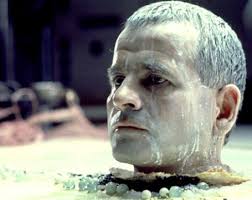 |
| Ash the Android from Alien 1997 |
One of the recurring themes I've noticed within the four films I have chosen to study is the theme of
Androids. Within three of the films (
Alien,
Prometheus and
Blade Runner) I have chosen to study, Androids have made appearances with very significant roles; although no androids appear in the movie
Gladiator, it only seems logical that they don't seeing as it isn't at all a
Science Fiction movie, however the other three films that I've listed all happen to include elements of the Sci-Fi genre, one of those main elements is of course Androids.
Scott always presents these androids in a similar way in each film; usually they are classed as a villain within the films, yet they don't always commit actual crimes against the heroes or other characters within the plots, they simply act very intellectual yet with a sinister side to their persona. All the androids in Scott's movies seem to have purpose, they are never minor characters, instead they are very significant to the plot and help to develop the narrative more than most of the human characters do. For example:
 |
| Roy Batty the main Android villain from Blade Runner |
- Ash from the movie Alien was given orders to "Bring back the Alien life form" this was both a critical threat and unbeknownst to the rest of the crew, all of which were human.
- David from the movie Prometheus takes many actions that puts the rest of his crew (again, all of which are human) at risk, although he saves them few times, he is the main reason they are all put in peril countless times, and yet he shows no remorse, even when it results in the death of a fellow crew member
- Batty is the main villain in the movie Blade Runner and is known as the world's most wanted replicant for murder and other crimes
Scott seems to present most of his Android characters as "superior beings" within each of his movies. They are always very intelligent, they posses increased strength in comparison to the human characters that they interact with, they also seem to have an agenda or purpose that not only jeopardizes many other characters lives, but makes their own character seem a lot more important than those around them even though they aren't even "living beings" themselves. It's as though Scott has an obsession with these Androids and sees them as the superior race to humans, I believe the perfect example is the most modern example:
David from the movie
Prometheus.
 |
| David the Android from Prometheus |
Appearance wise, David (Shown on the right) matches the "Aryan Race" which was once referred to by many as the "Superior race", he is a tall man with white skin, blue eyes and blonde hair (Roy Batty from Blade Runner also possesses this same similar appearance to the Aryan Race); David is even shown speaking and listening in the German language within the movie Prometheus. David also happens to be one of the only characters within the whole movie that has a sense of knowledge as to what entirely is going on in this alien planet that he and his crew members have discovered. In fact he is one of the only characters to survive all of it's threats and does not at any point show signs of fear, which contrasts with almost every human character within the film. This may all seem like a coincidence, but I believe Ridley Scott is trying to present these Android beings in a way that makes them seem above humanity itself, making their characters seem very important to the audience and the narrative of his movies, or at least science fiction movies.
